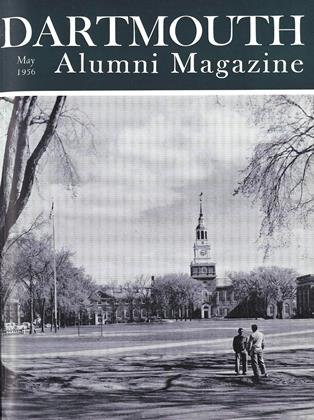Edited by RussellA. Fraser '47. Durham, N.C.: Duke University Press, 1955. 168 pp. $4.50.
The Court of Venus is, in Professor Fraser's words, "the generic title for three different fragments of a sixteenth century poetical miscellany," survivors of the Douce or Bodleian Court published between 1537 and 1539, the Stark (now in the University of Texas) published between 1547 and 1549 and the Folger (a reprint, the editor believes, of the lost Sutton Court of 1557) published between 1561 and 1564. In these fragments, consisting of fifteen, two, and eight leaves respectively, are preserved five poems certainly by Sir Thomas Wyatt, three probably by him, and seven others possibly by him, together with a prologue (found in Douce only) by Robert Shyngleton (a dissenting priest later hanged for treason) and a long poem attacking the clergy, also, Professor Fraser persuasively argues, by Shyngleton. This long poem, called The Pilgrim's Tale, appears only in the Douce fragment; without literary value, it has "dogged earnestness and heavy-footed sincerity" and reflects the troubled state of religion in the early decades of the century.
The Court of Venus influenced many writers from Edward VI's reign to James I's, including contributors to such famous poetical miscellanies as The Paradise of Dainty Devices (1576), A Handful of Pleasant Delights (1566 and 1584). and A Gorgeous Gallery of Gallant Inventions (1578). It made enemies, too; but most of them were Puritans who thought the poems licentious. Professor Fraser thinks that if we recover the complete text of the Court proper we shall be able to say of it what has been said of Tottel's Miscellany: "adequately to discuss its influence would be almost to write a history of the first three decades of Elizabethan poetry." The complete version might well have contained many new poems by Wyatt and lyric verse by such men as Thomas Lord Howard, Richard Hatfield, Sir Anthony Lee, and Edmund Knyvett, about whom we know next to nothing. We do know that the Stark fragment, called A Boke of Balettes, was at least ninety pages long; therefore more poetry must have been written and read in the reigns of Edward and Mary than we used to think. Even if the full text of the Court is never found, we can be sure of its three-fold importance: it preserved the work of a minor poet, Robert Shyngleton; in it first appeared the poems of Sir Thomas Wyatt; and it supplants Tottel's Miscellany as "the first landmark in the history of modern English verse."
In this work of scrupulous and intelligent scholarship, Professor Fraser has assigned dates to three fragments; determined the printer of each (Thomas Gybson of Douce, William Copland of Stark, Thomas Marshe of Folger); argued shrewdly from existing evidence where authorship is doubtful, as it is of ten lyrics and The Pilgrim's Tale; traced the probable and certain influences of the miscellany; and caused a minor revolution in literary history.
 View Full Issue
View Full Issue
More From This Issue
-
 Feature
FeatureD C U
May 1956 By GEORGE H. KALBFLEISCH, -
 Feature
FeatureOliver Wendell Holmes Slept – and Taught – Here
May 1956 By ROBERT S. BLUM '55 -
 Feature
FeatureNEW YORK ALUMNI AWARDS
May 1956 -
 Class Notes
Class Notes1918
May 1956 By ERNEST H. EARLEY, RICHARD A. HOLTON -
 Class Notes
Class Notes1923
May 1956 By CHESLEY T. BIXBY, THEODORE D. SHAPLEIGH -
 Class Notes
Class Notes1926
May 1956 By HERBERT H. HARWOOD, ANDREW J. O'CONNOR, RICHARD EBERHART '26
Books
-
 Books
BooksThe Congregational Churches of Vermon and their Ministry 1762-1914
June, 1915 -
 Books
BooksShelflife
Nov/Dec 2010 -
 Books
BooksBOUND FOR FREEDOM.
JUNE 1966 By HEINZ VALTIN -
 Books
BooksBIBLIOGRAPHY OF TEXAS,
MAY 1957 By MARCUS A. MCCORISON -
 Books
BooksTHE DARTMOUTH BOOK OF WINTER SPORTS
January 1940 By Nathaniel L. Goodrich -
 Books
BooksWITH AN EYE ON THE GALLERY.
JANUARY 1967 By TRUMAN H. BRACKETT JR. '55

